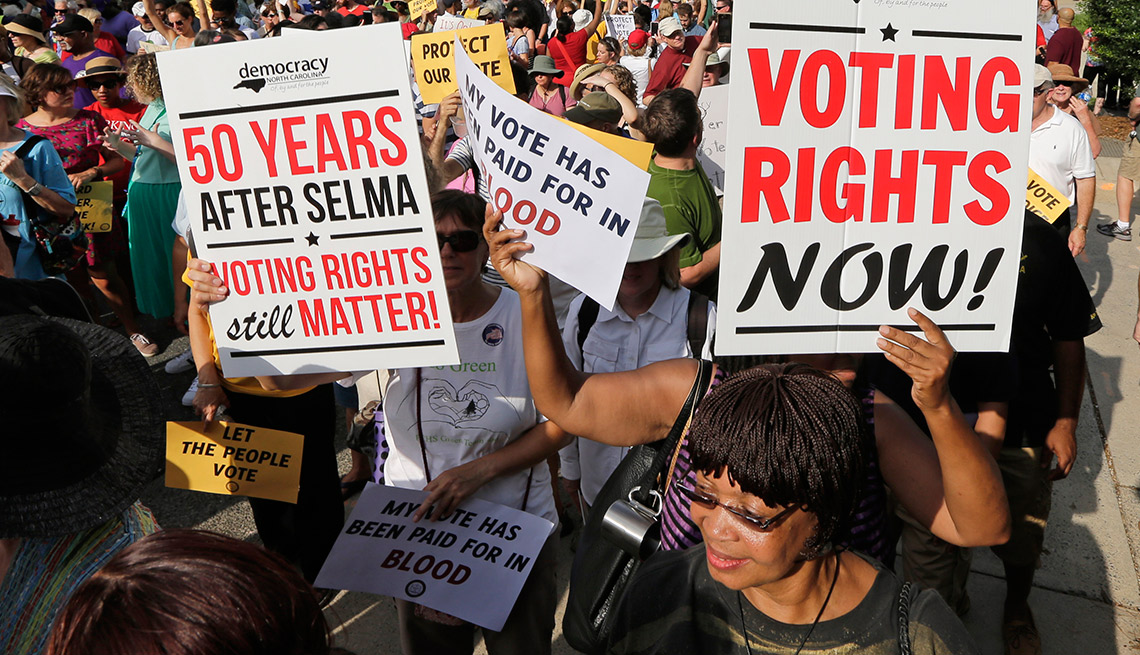Play all audios:
* Getty Images HALF A CENTURY En español l The Voting Rights Act, signed into law at the height of the civil rights movement, prohibits racial discrimination in voting. At its 50th
anniversary, the landmark law has lost some bite. 1 of 11 * Istock RECONSTRUCTION Ratified by the states in 1870, the 15th Amendment to the U.S. Constitution bans voter restriction on the
basis of “race, color, or previous condition of servitude,” but before long states in the South pass new constitutions and laws incorporating literacy tests, poll taxes, property ownership
requirements, moral character tests and other restrictions that keep black citizens from voting. 2 of 11 * Getty Images MUCH TO ACCOMPLISH Along with the goals of ending job discrimination
and desegregating public accommodations, the push to restore voting rights undermined in many states drives the civil rights movement in the early 1960s. 3 of 11 * AP NOT ENOUGH The Civil
Rights Act of 1964 doesn’t end violence against African Americans trying to vote in the South. After state troopers attack peaceful marchers in Selma, Ala., on March 7, 1965, President
Lyndon B. Johnson calls for a strong voting rights law; congressional hearings begin. 4 of 11 * National Archives/Getty Images A LAW AT LAST Signed by Johnson on Aug. 6, 1965, the
groundbreaking law prohibits racial discrimination in voting. The heart of the law, Section 5, blocks nine states, mostly in the South, plus various other jurisdictions with histories of
discrimination from changing voting procedures that could affect minorities without prior approval from the U.S. attorney general or a federal court. 5 of 11 * Getty Images INSTANT RESULTS
By the end of 1965, 250,000 new black voters register. 6 of 11 * Getty Images GETTING IT DONE The U.S. Department of Justice describes the Voting Rights Act as “generally considered the most
successful piece of civil rights legislation ever adopted by the United States Congress.” Since 2010 alone, the department has had 18 Section 5 objections to voting laws in Texas, South
Carolina, Georgia, North Carolina, Mississippi and Louisiana. 7 of 11 * Win McNamee/Getty Images STRIPPED The Supreme Court strikes down a key section of the Voting Rights Act in June 2013,
freeing nine states, mostly in the South, to change their election laws without advance federal approval. 8 of 11 * Getty Images VOTER ID LAWS Much of today’s debate on voting rights centers
on new voter identification laws. Thirty-two states now have some form of voter ID law, which critics say complicates voting for the poor, minorities and older voters. 9 of 11 * AP LOOKING
FORWARD A number of bills introduced in Congress, the first seven months after the Supreme Court’s 2013 ruling and the most recent this 50th-anniversary year, would restore the law’s core
protection. None has gotten much traction. 10 of 11 * VIEW MORE SLIDESHOWS * YOU'VE GOT TO BE KIDDING — THAT'S OUTRAGEOUS! * JFK: PERSONAL PORTRAITS FROM A PUBLIC LIFE * After
D-Day, 'Somewhere in France' Member Discounts! Save on vision care, prescription drugs, hearing aids and more 11 of 11

